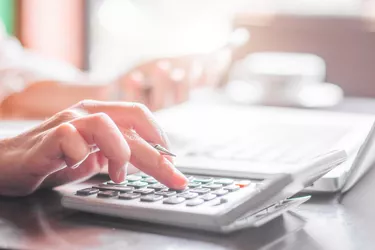
A budget provides you with a detailed picture of how much income you'll bring in and what you expect to spend and save, often on a monthly basis. Knowing these amounts at the start of the month can help you make better spending choices as well as ensure you'll have enough money to actually pay your bills. In addition to controlling your spending, you'll also be better prepared to plan for your future goals and handle emergencies your family might face. Understanding the importance of a budget will help you best take advantage of this useful personal financial tool.
Control Your Spending
Video of the Day
The purpose of a budget is to help you better control your spending so that you have enough money to pay for all your living expenses and bills. When making a budget, you'll add up all your income sources and then estimate all regular costs such as your car payment, mortgage, insurance premiums, debt payments and taxes. You'll also add your more flexible expenses like clothing and entertainment costs. Generally, you'll want to spend no more than half your income on basic needs and no more than 30 percent on your wants.
Video of the Day
Subtracting all your expenses from your income shows you whether you expect to have a shortage or excess of cash. If you have excess cash, you might invest that or put in a savings account. If you'll have a shortage, though, this indicates you need to check your spending and cut down on unnecessary costs, or you'll need to consider another source of income.
As you make purchases during the month, you'll also add the actual expense amounts to your budget. Comparing your estimated versus actual costs can show you key areas where you need to cut your spending to improve your financial health. For example, if you budget $50 for entertainment but end up actually spending $200 for concert tickets, you might need to consider cheaper outings if you're tight on cash.
Plan for Large Purchases
Whether you'd like to buy a home or save up for a new car, having a budget makes it easier to plan for these large expenditures. When you have excess cash in your budget, you can put aside an amount regularly toward your future purchase. For example, maybe you have a large homeowners insurance bill due every January. You might divide the amount by 12 and set aside a regular monthly amount to save in your budget.
In cases where you're struggling financially, your budget can also help you decide whether such a purchase is right for your financial situation. Perhaps your budget has room to save up for a used car but not enough for the new one you have your eye on. You could either look where you can cut other expenses to save up for the new car, find a way to earn more money or begin budgeting a lower amount for the used car.
Build Your Emergency Fund
When sickness strikes, your car breaks down or you face a sudden job loss, having an emergency fund with at least three months of living expenses is essential. Using a budget makes it easier to both estimate how much of an emergency fund you'll need as well as plan for putting money in your emergency fund regularly until you reach your goal.
For example, if your monthly expenses are $2,000 a month, you'd need at least $6,000 in your emergency fund. You might begin saving $100-200 a month until you reach that goal. You can then decide to build a larger emergency fund – say, of six months of expenses – or begin saving for another purpose.
Save Money for Retirement
The purpose of a budget is to also help you plan for your eventual retirement. While you'll, of course, want to check your budget to make sure you can pay your regular bills, prepare for an emergency and plan for major purchases, you'll also want to be regularly putting aside an amount in a 401(k), IRA or other retirement investment account. If your budget shows that you can't afford to save for retirement, you may need to reconsider other future purchases or find a cheaper way to live.
While how much you'll need can depend on factors like desired retirement lifestyle and age of retirement, CNN Money suggests taking 10 to 15 percent out of your monthly pay for this purpose. If this sounds like a lot to you, saving what you can afford right now and putting back more money later is still better than not saving for retirement at all. You can use an online retirement calculator like the one offered by Bankrate.com to get a personalized savings suggestion and a projection of how your money would grow over time.